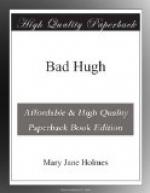“It may spare you some pain if I tell you first what I know of the tragedy at Spring Bank. I know that ’Lina is dead, and that the fact of my existence prevented the marriage. So much I heard Mr. Stanley tell his sister. I had just come to her then. She was prouder toward me than she is now, and with a look silenced him from talking in my presence, so that was all I ever knew, as I dared not question her lest I should be suspected. Go on, you spoke of my parents, my brother. Who are they?”
Her manner perplexed him greatly, but he controlled himself, while he repeated rapidly the story known already to our readers, the story which made Adah reel where she sat, and turn so white that he attempted to reach her, and so keep her from falling. But just the touch of his hand had power to arouse her, and drawing back she laid her face in the hay, and moaned:
“That gentle woman, my mother; that noble Hugh, my brother! it’s more than I ever hoped. Oh, Heavenly Father, accept my thanks for this great happiness. A mother and a brother found.”
“And husband, too,” chimed in the doctor, eagerly, “thank Him for me, Adah. You are glad to find me?”
There was pleading in his tone—earnest pleading, for the terrible conviction was fastening itself upon him, that not as they once parted had he and Adah met. For full five minutes Adah lay upon the hay, her whole soul going out in a prayer of thankfulness for her great joy, and for strength to bear the bitterness mingling with her joy. Her face was very white when she lifted it up at last, but her manner was composed, and she questioned the doctor calmly of Spring Bank, of Alice, of Hugh, of Anna, but could not trust herself to say much to him of Willie, lest her calmness should give way, and a feeling spring up in her heart of something like affection for Willie’s father. Alas, for the miserable man. He had found his wife, his Adah, but there was between them a gulf which his own act had built, and which he never more might pass. He began to suspect it, and ere she had finished the story of her wanderings, which at his request she told, he knew there was no pulsation of her heart which beat for him. He asked her where she had been since she fled from Terrace Hill, and how she came to be in Mrs. Ellsworth’s family.
There was a moment’s hesitancy, as if she were deciding how much to tell him of the past, and then resolving to keep nothing back which he might know, she told him how, with a stunned heart and giddy brain, she had gone to Albany, and mingling with the crowd had mechanically followed them down to a boat just starting for New York. That, by some means, she never knew how, she found herself in the saloon, and seated next to a feeble, deformed little girl, who lay upon the sofa, and whose sweet, childish voice said to her pityingly:
“Does your head ache, lady, or what makes you so white?”




